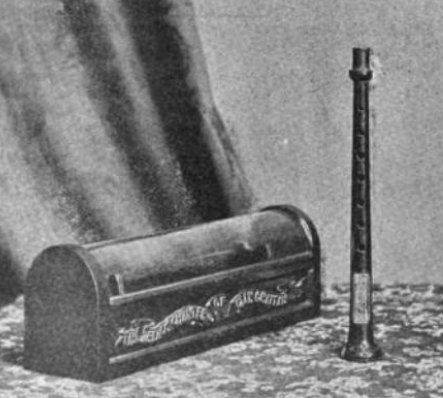The Black Chanter of Clan Chattan

Among the many interesting historical relics carefully treasured at Cluny Castle Inverness-shire, the seat of the chief of the Clan Chattan, is the Black Chanter, or Feadan Dubh of the clan, on the possession of which the prosperity of the House of Cluny is popularly supposed to depend.
Of the many singular traditions regarding it, one is that it originally fell from heaven during the memorable clan battle, rendered familiar through the pages of Scott’s “Fair Maid of Perth”, fought between the MacPhersons and the Davidsons, in the presence of King Robert III., his queen, and nobles, on the North Inch of Perth, in 1396, and that being made of crystal, it was broken by the fall, and the existing one made in facsimile.
Towards the end of the combat, we are told that there was seen an aerial minstrel hovering over the heads of the MacPherson, and that, after playing a few wild strains on the instrument, he let it drop from his hand. The MacPherson piper secured this enchanted pipe, and, even though mortally wounded, poured forth the pibroch of his clan until death effectually silenced his music. The Black Chanter was ever after endowed with magical properties, in the opinion of the Clan MacPherson.
Another tradition is to the effect that this is the genuine, original Black Chanter, and that the cracks seen on it were occasioned by its violent contact with the ground; but be its origin what it may, it is a notable fact in the Highlands that, whether in consequence of its possession, or of their own bravery, not one battle at which the MacPhersons were present with it was ever lost.
It is rumored, that before the battle of Culloden, an old witch or seer told the Duke of Cumberland that if he waited until the famous green banner and the Black Chanter came up he would be defeated. As a matter of fact, Ewen, of Cluny, with six hundred of his clan had been present at the battle of Prestonpans, and had accompanied ‘Bonnie Prince Charlie’ into England. On the latter’s retreat to Scotland, Cluny with his men put two regiments of Cumberland’s Dragoons to flight at Clifton, fought afterwards at Falkirk, and was on his way from Badenoch to Inverness to join the Prince when fleeing fugitives from Culloden met him with the news of that day’s sad disaster.
The celebrity of the Highland bagpipes and the part that have played, in the history of the Scottish regiments are well known. The potency of bagpipe music on the hearts of all true Highlanders is universally acknowledged, and to those whose dearest associations are connected with the heather-clad mountains and rushing torrents of the Highlands, there is something singularly heart-stirring in the Failte on the strains of the bagpipe, and something inexpressibly touching in the plaintive notes of the lament., especially when heard in after-years, perhaps in the exile of a distant land. With the echoes of the enthralling tones of the Black Chanter in their hearts, can we wonder, then that it was dearly prized by the MacPhersons’ and not alone for the prosperity it ensured to them?
The Feadan Dubh, also brought good fortune to its temporary possessors when lent to other clans by the generosity of the chief of the time. The Grants of Stratspey, having received and affront through the cowardice of some unworthy member of that clan, and being dejected beyond measure borrowed the magical instrument. Its bold war notes soon roused their drooping energies and simulated them to such valour, that from time forth it passed into a proverb that ‘no one ever saw the back of a Grant.’
It was afterward borrowed by the Grants of Glenmoriston, and it was restored to the chief of Clan Chattan only in the early part of the 19th century. The superstitious, point out triumphantly, that it was while the Feadan Dubh was out of the MacPherson’s possession, during the later part of the eighteenth century that their beloved chief, ‘Cluny of the 45’, suffered such terrible hardships due to his devotion, to the cause, of the hapless Stuarts, dying in exile in France, far away from his beautiful mountain glens, whose frowning crags had so often re-echoed the piercing notes of the Black Chanter, calling the brave Clan Chattan to battle.